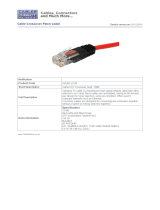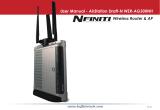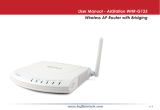Page is loading ...

Networking Basics
1- What is a network?
A network is a group of computers, printers, and other devices that are connected and
communicate wit each other. The medias used in networking can be copper wire , fiber
optics or radio waves. The three type of networks are Local Area, Metropolitan and
Wide Area Network which are commonly called LAN, MAN and WAN.
2- What is a LAN topology?
LAN topologies define the manner in which network devices are organized.
3- What is the definition of Ethernet?
Ethernet is the most widely used network standard. Specified in, IEEE802.3, Ethernet
was originally developed by Xerox and then developed further by Xerox, DEC, and Intel.
4- What does UTP stand for?
Unshielded Twisted Pair and is the type of cable used in Ethernet networks.
5- What is a CAT5 cable?
CAT 5 is the highest quality UTP cable and is tested for conductivity over a 100MHz
signal. The Cat5 cable is not a guarantee that the cable is 100% compliant to the
standards especially if it is not properly connected to the RJ-45 connector/jack.
6- What are the numerical/color wiring layout of a straight-through
CAT5 cable?
Pin 1 and 2 are connected to the same twisted pair wire. 1-Orange/White 2-Orange
Pin 3 and 6 are connected to the same twisted pair wire. 3-Green/White 6-Green
Pin 4 and 5 are connected to the same twisted pair wire. 4-Blue/White 5-Blue
Pin 7 and 8 are connected to the same twisted pair wire. 7-Brown/White 8-Brown
7- What is the wiring layout of a crossover cable?
Pin 1 to Pin 3 Pin 5 to Pin 5
Pin 2 to Pin 6 Pin 6 to Pin 2
Pin 3 to Pin 1 Pin 7 to Pin 7
Pin 4 to Pin 4 Pin 8 to Pin 8
8- What is Token Ring?
The token ring is the second most widely-used LAN protocol after Ethernet.
A token ring network is a local area network in which all computers are connected in a ring or star
topology and a token-passing scheme is used in order to prevent the collision of data between

two computers that want to send messages at the same time. Token Ring is specified by
IEEE802.5 standard.
9- What is ArcNet?
ARCNET is a local area network technology that uses a token-bus scheme for managing line
sharing among the workstations and other devices connected on the LAN.
10- What is a Protocol?
A Protocol is the language the nodes on a network use to communicate with each other.
11- Name a few LAN devices.
Hubs, Switches, Bridges and Routers
12- What is a HUB?
HUB is a passive network device (physical layer device) that allows network nodes to
communicate with each other. The packets received on each port will be broadcasted to
all ports on the hub. In hubs the bandwidth is shared between all connected devices.
13- What is a Switch?
Switch is a network device (layer II) that provides dedicated connections for network
nodes. Unlike hubs that broadcast packets to all ports, switches provide dedicated
bandwidth between source and destination ports.
14- What is a Bridge?
Bridges are network devices (Layer II) that can be used to segment LANs and are used to
provide more control on the network traffic.
15- What is a Router?
Routers are network devices (layer III) that are used for connecting different networks
and are responsible for routing packets from source to destination based on their routing
table.
16- What does NIC stands for?
Network Interface Card.
17- What is a MAC address?
MAC address is a unique 6byte number that is burned into each card when it is
manufactured.
18- What are the main networking components needed to setup
networking on a computer?
Client, adapter and protocol are the three components needed to setup a network between
two computers.
19- What is a network card driver?

Drivers are the software that makes the operating system to communicate with the
hardware. For example, to install a network card in any system, one needs the drivers
that are specifically written for that operating system.
20- What is the mostly used network protocol?
TCP/IP, which stands for Transport Control Protocol/Internet Protocol.
21- What is an IP address?
IP addresses are addresses that identify each node on the Internet. These addresses are
either assigned by a network administrator or received from a DHCP server. Each IP
address is comprised of 4 octets or 32 bits (IPv4).
22- What are class A, B, and C IP addresses?
Class A IP addresses are IP addresses which the first octet is the Net ID and the
remaining 24 bits identify the Host ID. In class A IPs the first octet is from 1 to 126. IN
class B IPs, the first two octets define the Net ID and the remaining 16 bits are for host
identification. These addresses start from 128 to 191. Class C addresses use the first
three octets foe Net ID and the last 8 bits are for host identification. This range of IPs
start from 192 to 223.
23- What are CNet’s Network adapter cards?
Pro200 PCI 10/100Mbps
Pro200WL PCI Wake On LAN 10/100 Mbps
CNF401 PCMCIA 10/100 Mbps 32 bit card bus adapter
CN40BC PCMCIA 10Mbps 16 bit
CNWLC-811 PCMCIA 802.11b Wireless LAN card
CNUSB-611 USB 802.11b Wireless LAN card
GNIC2000 PCI Giga NIC card
24- Is Pro 200 supported in XP?
Yes. The drivers for winXP are included in the operating system.
25- How can I network two computers?
- First thing is to identify the Operating Sytem that you are running on each system.
- Second is to acquire a network adapter that is supported in that operating system
or in other words, the manufacturer has drivers for it in that OS.
- Third is to install the network cards on each system.
- Forth is to decide on whether using a direct cable between the two systems or
using a hub/switch. If the two systems are connected directly, a crossover cable
must be used. When connecting to a hub or switch, a straight through
cable is
needed.
26- How can I connect to the Internet using a Cable/DSL modem?

Scenario#1: There is only one PC to connect to the Internet. In this case, you need the
network card and also the Cable/DSL modem that is provided by your Internet Service
Provider and a connecting cable (cable type needs to be verified with the ISP/modem
manufacturer. Some modems connect using a straight through cable and some require a
crossover cable) that would go between the computer and the modem.
Scenario#2: There are more than one computer to connect to the Internet through the
cable/DSL modem. In this case, assuming that you have the permission of your ISP for
sharing that cable/DSL line between several systems, you can use Internet Connection
Sharing (ICS)or an Internet Broadband Gateway, which basically allows LAN
connections to shares the connection to the Internet.
/


